|
|
|
Sort Order |
|
|
|
Items / Page
|
|
|
|
|
|
|
| Srl | Item |
| 1 |
ID:
140328
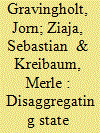

|
|
|
|
|
| Summary/Abstract |
This conceptual and methodological article makes the case for a multidimensional empirical typology of state fragility. It presents a framework that defines fragile statehood as deficiencies in one or more of the core functions of the state: authority, capacity and legitimacy. Unlike available indices of state fragility, it suggests a route towards operationalisation that maintains this multidimensionality. The methodology presented should help in future research to identify clusters of countries that exhibit similar constellations of statehood, whereby ‘constellation’ refers to the specific mix of characteristics across the three dimensions. Such an identification of empirical types would fulfil a demand that exists both in academic research and among policy circles for finding a more realistic model of fragility at an intermediate level between single-case analyses and the far-too-broad category of state fragility.
|
|
|
|
|
|
|
|
|
|
|
|
|
|
|
|
| 2 |
ID:
181095
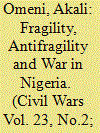

|
|
|
|
|
| Summary/Abstract |
Focusing on Biafra’s calculus of war to shed new light on the rebel-side debate, this article revisits the Civil War of Nigeria (1967–1970) to extract campaign lessons for the Nigerian Army (NA) in its fight against Boko Haram (BH). The paper uses Nassim Taleb’s ‘antifragility’ theory to explain why Biafra rebels crumbled under traditional military campaign stressors imposed on them. By contrast, Boko Haram’s ‘antifragile’ threat has grown, even as campaign stressors imposed by the NA increased. Embracing the differences in operational environment within both conflicts, this article reflects on the implications of BH’s antifragility for the NA’s counter-insurgency (COIN).
|
|
|
|
|
|
|
|
|
|
|
|
|
|
|
|
| 3 |
ID:
154065
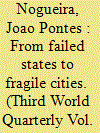

|
|
|
|
|
| Summary/Abstract |
It has become commonplace to claim that cities are becoming conflict zones, or ‘war zones’. This article traces some of the discursive and conceptual shifts that made it possible to define the city as a new frontier for international humanitarian action in states of the Global South. In order to represent cities as humanitarian spaces, concepts of ‘failure’ and ‘fragility’ have been problematised and subjected to reinterpretations that legitimised new strategies applied to the urban realm. I argue that this re-scaling of humanitarian practices enables a de-coupling and inclusion of so called new ‘urban conflicts’ in strategies of global liberal governance. Moving from failed states to fragile cites is a key development to understand changes in the practices that redefine humanitarian spaces today. The definition of urban violence as a new type of conflict informs a new cycle of expansion of the humanitarian order focused on the city. The article analyses the problematisation of concepts of failure and fragility as a decisive move to redefine the boundaries of humanitarian spaces.
|
|
|
|
|
|
|
|
|
|
|
|
|
|
|
|
| 4 |
ID:
160015
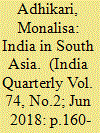

|
|
|
|
|
| Summary/Abstract |
In fragile and conflict-affected States1 (henceforth FCAS) in South Asia, two distinct forms of international engagement have worked simultaneously—the engagement of India, the regional hegemon, and that of Western states that promote liberal peacebuilding projects. From Norwegian engagement in Sri Lanka to European Union (EU) and United Nations (UN) engagement in Myanmar, to the UN-led international engagement in Nepal, liberal peacebuilding, despite its fault lines, has ubiquitous presence in South Asia, a region fraught with different forms of conflict and fragility. The norms, practices and modalities of engagement of India as well as of liberal peacebuilding projects have their distinct specificities in their normative foundations, practices and modalities of engagement. This article contends that the current interaction, though often unacknowledged, is marked by uncertainties, contrasts, instrumental use of norms, lack of coordination and even unexpected overlaps. This article primarily argues that in order for India to play a constructive role in the region, it needs to devise a policy on how it engages with liberal peacebuilding norms and its diffusion in practice through a variety of organisational and institutional networks.
|
|
|
|
|
|
|
|
|
|
|
|
|
|
|
|
| 5 |
ID:
152795
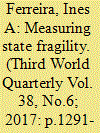

|
|
|
|
|
| Summary/Abstract |
State fragility has become a resonant term in the development discourse over the past decade. In its early days it served as a catch-all phrase used by donor organisations to draw attention to the need to assist ‘fragile states’. In response to the call for a better understanding of how to deal with these countries, there was a surge in measures of fragility. However, it was not long before academics pointed to the murkiness and fuzziness of the term, and identified several caveats to most of the proposals for quantification. This paper reviews existing approaches to operationalise this concept, distinguishing between those that offer no ranking or only partial rankings of fragile states, and those providing ordinal lists of countries. The examination of their theoretical underpinnings lends support to the critical view that most existing approaches are undermined by a lack of solid theoretical foundations, which leads to confusion between causes, symptoms and outcomes of state fragility.
|
|
|
|
|
|
|
|
|
|
|
|
|
|
|
|
| 6 |
ID:
140438


|
|
|
|
|
| Summary/Abstract |
Within the interdisciplinary literature on cosmopolitanism, one particularly important distinction stands out as a recurring motif. Specifically, scholars have been concerned to distinguish between cosmopolitanism as a set of mundane practices and/or competences on the one hand and cosmopolitanism as a cultivated form of consciousness or moral aspiration on the other. For anthropologists, this distinction between aspiration and practice is often rendered ambiguous across the diverse expressions of cosmopolitanism that they encounter ‘on the ground’. This special issue therefore brings together five contributions from anthropologists who are reporting on encounters and aspirations that reveal different forms of spatial mobility, scales of commitment or risk, and are often transient, ambivalent and precarious. These are circumstances in which cosmopolitanism emerges as uneven and partial rather than as a comprehensive or unequivocal transformation of practice and outlook.
|
|
|
|
|
|
|
|
|
|
|
|
|
|
|
|
| 7 |
ID:
123579
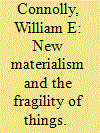

|
|
|
|
|
| Publication |
2013.
|
| Summary/Abstract |
The 'new materialism' is the most common name given to a series of movements in several fields that criticise anthropocentrism, rethink subjectivity by playing up the role of inhuman forces within the human, emphasize the self-organizing powers of several nonhuman processes, explore dissonant relations between those processes and cultural practice, rethink the sources of ethics, and commend the need to fold a planetary dimension more actively and regularly into studies of global, interstate and state politics. After reviewing several key tenets of this diverse movement in philosophy, biology and the human sciences, we focus on how it casts light on the dissonant relations between the drives of neoliberal capitalism and boomerang effects from nonhuman forces. Exploration of such relations both dramatises the fragility of things today and helps to explain why many constituencies refuse to acknowledge and address it. After presenting a few capital-force-field conjunctions that illustrate the fragility of things, this article briefly explores some intercoded counter-strategies to address the contemporary predicament.
|
|
|
|
|
|
|
|
|
|
|
|
|
|
|
|
| 8 |
ID:
094092
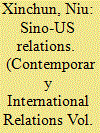

|
|
|
| 9 |
ID:
140327
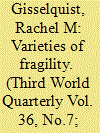

|
|
|
|
|
| Summary/Abstract |
Aid to fragile states is a major topic for international development. This article explores how unpacking fragility and studying its dimensions and forms can help to develop policy-relevant understandings of how states become more resilient and the role of aid therein. It highlights the particular challenges for donors in dealing with chronically fragile states and those with weak legitimacy, as well as how unpacking fragility can provide traction on how to take ‘local context’ into account. It draws in particular on the contributions to this special issue to provide examples from new analysis of particular fragile state transitions and cross-national perspectives.
|
|
|
|
|
|
|
|
|
|
|
|
|
|
|
|
|
|
|
|
|